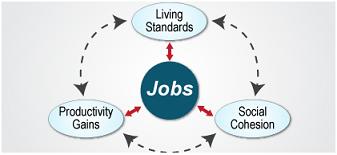Given worldwide concern over jobs, it makes sense that the 2013 World Development Report (WDR) is on jobs. According the ILO, though growth has resumed in some regions, the global employment situation is bleak and shows no sign of recovery in the near term.
 The WDR, which is being launched this autumn, will posit that jobs are more than what people earn or what they do at work -- they are also part of who they are. With that in mind, the report will use a jobs lens to look at multiple outcomes associated with jobs – how they contribute to living standards, productivity and social cohesion.
The WDR, which is being launched this autumn, will posit that jobs are more than what people earn or what they do at work -- they are also part of who they are. With that in mind, the report will use a jobs lens to look at multiple outcomes associated with jobs – how they contribute to living standards, productivity and social cohesion.
Many countries around the globe are facing jobless growth as well as persistent poverty. Given such dilemmas, governments are looking hard at new approaches that can foster employment and dynamic transformation.
The jobs agenda is bound to differ based on key country characteristics—from agrarian economies to resource-rich countries to post-conflict countries to countries with high youth unemployment or to countries with aging populations.
There is not a one-size-fits-all approach. Every jobs agenda should look at the relative importance of raising living standards, productivity and social cohesion.
I hope readers will visit the WDR 2013 website to learn more about how the report is being produced, who the team is, and to watch a video of the report's Director, Martin Rama, explaining the transformational role of jobs.
Complementing the WDR is the newly launched Jobs Knowledge Platform (JKP), an initiative managed by several teams across the World Bank in collaboration with key institutional partners. The JKP aims through its dynamic partner website to engage a broad community of interested stakeholders to help find ways to create jobs and improve employment opportunities around the world.


Join the Conversation